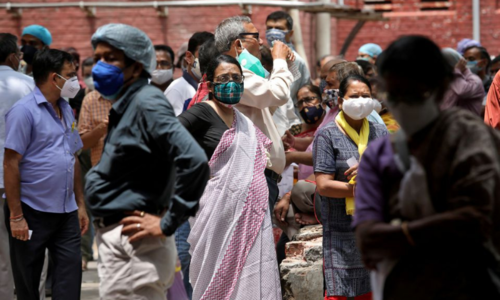NEW DELHI: Several thousand coronavirus patients in India have contracted a deadly and aggressive fungal infection, compounding the country’s woes as it reels from the pandemic.
What is the fungus?
Mucormycosis, dubbed “black fungus”, is caused by a mould found in soil and in decaying organic matter like rotting leaves, according to the US Centers for Disease Control and Prevention (CDC).
People get mucormycosis, of which there are several types, by breathing in the fungal spores. They can be spread in hospitals and homes by air humidifiers or oxygen tanks containing dirty water.
High fatality rate
The infection needs to be caught early as it is aggressive and dead tissue has to be scraped away. Surgeons sometimes have to remove patients’ nose, eyes or even their jaw to stop it getting to the brain.
The average fatality rate is 54 percent, according to the CDC.
Once infected, people can die within days. However, it is not contagious, according to the CDC. India normally deals with a few dozen cases a year.
Generally the body’s defences repel the fungus and only those with severely weakened immune systems —for example organ transplant or cancer patients — are affected.
Why are coronavirus patients at risk?
With coronavirus and other conditions, a dangerous phenomenon called a “cytokine storm” can occur where the immune system goes into overdrive, damaging organs.
Doctors have been prescribing steroids to reduce the immune response.
But this weakens the body’s defences and increases sugar levels, which funguses thrive off.
What other factors are there?
Diabetics — who also have excessive sugar in their bloodstream -- are also at higher risk. India has high rates of diabetes.
Some hospitals and doctors have been over-prescribing steroids, and some people have been taking them at home without medical advice.
“People have started using (steroids) liberally, excessively and inappropriately,” Professor K. Srinath Reddy, from the Public Health Foundation of India, said.
How many infections are there?
There are at least 7,250 cases in India, according to the Hindustan Times, which cited a government court submission.
Maharashtra state has now reported more than 2,000 cases. Gujarat, home state of Prime Minister Narendra Modi, has about 1,200, officials said.
Nine Indian states have now declared the infection an epidemic.
Several cities have opened special hospital wards.
Authorities have not said how many people have died nationally from black fungus. According to the Hindustan Times, 219 people — likely an underestimate — have died.
There are severe shortages of the main anti-fungal drug to treat the infection, amphotericin B.
The government and drug companies in India, once dubbed the “pharmacy of the world”, are scrambling to ramp up production.
Amulya Nidhi, a health activist, said the government had earlier failed to prepare an adequate supply of coronavirus medicines such as remdesivir and plasma.
Published in Dawn, May 22nd, 2021















































